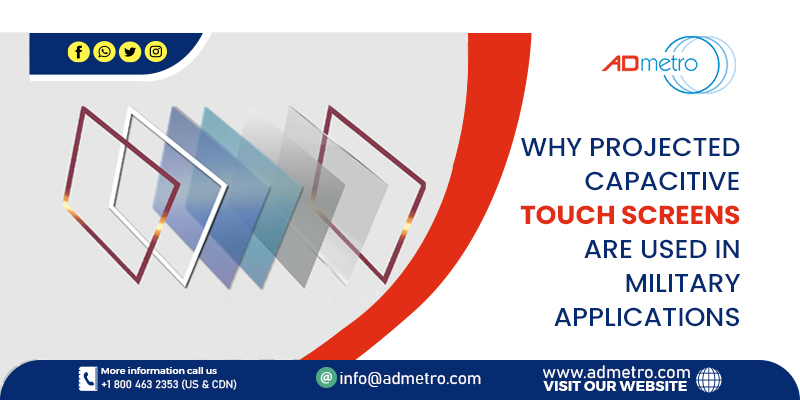Ever since its development, Projected Capacitive (PCAP) touch screens have captured over 90% of the touch applications market. And the market trend indicates that this figure will grow. Also, the demand for rugged touch displays is increasing day by day, especially in the field of aerospace and defense where touch screen displays have become a vital tool for operators. They allow access to information in limited-space environments without using extra tools like keyboards or a mouse. For this, the touch screen needs to be strong enough to survive a rugged environment and ensure flawless operations.
Projected Capacitive (PCAP) touch screens are perfect fit for rugged displays. They respond to changes in capacitance due to human touch. When the screen is touched, its electrostatic field gets disturbed, resulting in a touch response. It is typically chosen for defense applications because of its superior optical clarity, durable glass surface, and multi-touch capability.
Here are three benefits of PCAP touch screens relevant to military displays, especially those required to sustain harsh environments while supporting operators with seamless access to information and readability efficiency.
Familiar Technology
PCAP touch screens are widely used for their intuitive, multi-touch gestures feature, commonly available with smartphones, tablets, and other touch screen devices. Military operators are well-familiar with PCAP touch technology so it becomes a convenient choice for mission displays. It allows operators to focus on their tasks with the familiarity of the touch interface through common use with their own personal devices.
Feasible to Operate in the Field
Military operators are not always in perfect conditions- dry and clear weather with ample space to work, is not usually the norm. The displays need to be strong enough to meet cramped conditions where knocks and accidental impacts may occur.
PCAP touch screens have evolved to make it work with gloved hands while interacting with the display device. They are water-resistant, and with water rejection firmware, it can allow the screen to function normally even in moderately wet conditions.
Increased Ruggedness for Military Applications
PCAP touch screens are not pressure-activated and have superior quality glass-on-glass sensor construction making the display highly durable. Some sensor designs that employ polyester film to carry the sensing transparent conductive layers can continue to operate even if the glass front is cracked.
With the growing popularity of PCAP touch screens for military applications, touch screen manufacturers are even more concerned about making this technology much stronger and well-adapted to electronics and enclosures. This is to ensure that they meet military standards and can comfortably be used in different field conditions.
A D Metro, the leading manufacturer of innovative touch screen solutions, offers PCAP touch screens bundled with their patented advanced ARGON controller. It is an intelligent PCAP controller that automatically detects and adapts to the sensor. It is designed for great compatibility with harsh environments and mission-critical equipment. Particularly, suitable for embedded applications, the ARGON controller eliminates the usage of any tuning software to set its parameters, making it easy to set up and compatible with any operating system. It automatically senses USB, I2C or RS232 (3.3V) connection and reports touch coordinates accordingly.







